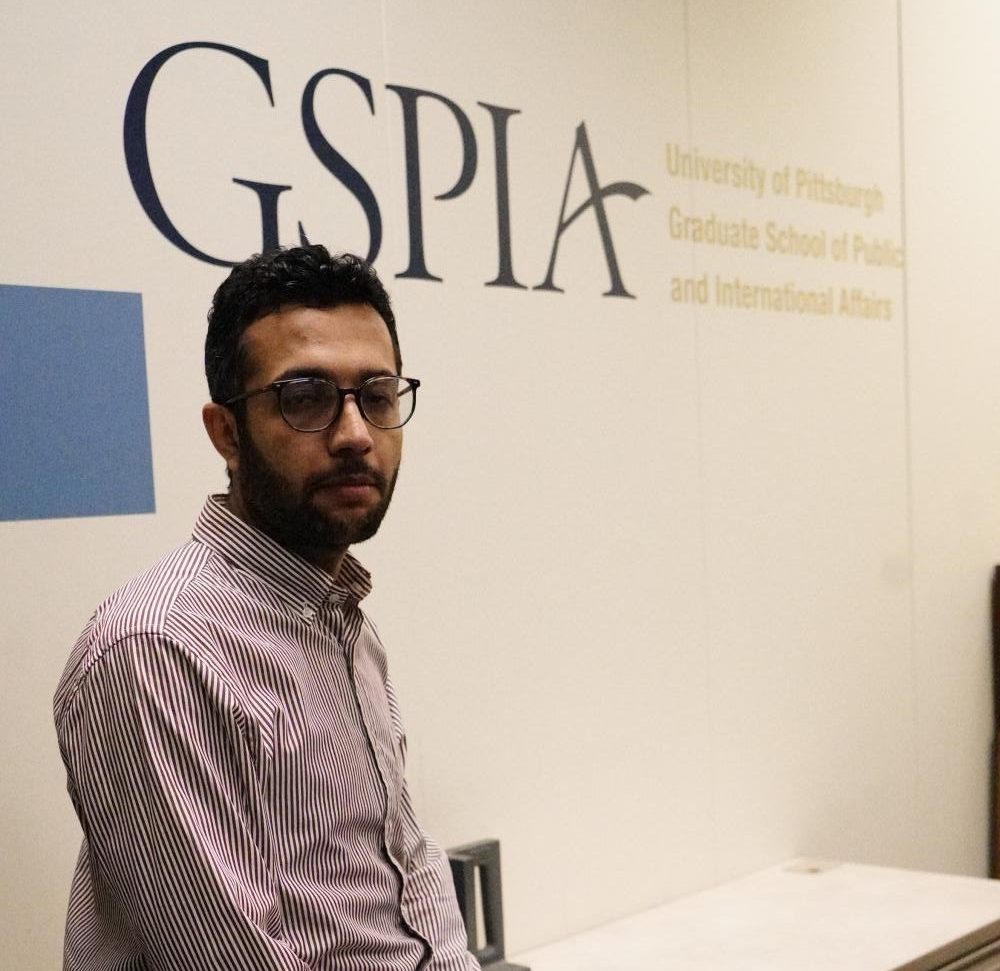‘A sense of responsibility’: Pitt’s Afghanistan Project takes in 10 Afghan scholars


Omar Sadr, a political science and economics researcher in the Center for Governance and Markets.
Hasina Jalal, a longtime advocate for women’s rights in Afghanistan and a Pitt graduate student, has spent much of her time in the U.S. advocating for Afghans living under Taliban rule, in large part thanks to Pitt’s Afghanistan Project.
“I have the opportunity to amplify the voices of other Afghan women and scholars here in the United States,” Jalal said. “I can collaborate with different scholars from different organizations, universities and think tanks, which would not have been possible inside Afghanistan.”
Jalal is one of 10 Afghan researchers that the program has helped evacuate to the U.S. since the Taliban took control of Kabul in August 2021. Jen Murtazashvili, a professor in the Graduate School of Public and International Affairs who founded the program in July 2021, said its objective is to “preserve the intellectual communities of Afghanistan.”
“Because that community, which went from almost zero in 2001 to actually the most sophisticated in the region, was going to get wiped out,” Murtazashvili said. “The individuals will be okay, but our scholarship occurs in a community.”
Murtazashvili said she started funding the project with a $1.35 million anonymous donation and additional grants from foundations.
“I felt a real sense of responsibility, because many of my friends and colleagues were among those affected,” Murtazashvili said. “As a scholar, once you stop doing academic research, it’s almost impossible to go back. And I just thought it would be tragic if these people had to stop doing their work because of the politics inside their country. So what I tried to do was bring as many people here as I could, and to create a scholarly community.”
She said she spends a lot of time helping Afghan researchers navigate “time consuming” immigration and travel processes. She explained that since refugees can’t apply for a visa inside Afghanistan, Pitt’s Afghanistan Project must first find a way to get them to an embassy in countries such as India or China, where they then must wait for the U.S. government to approve their visa application and refugee status.
“We have one scholar who was accepted, but his wife and child didn’t get visas,” Murtazashvili said. “We have another scholar who was put under administrative processing, and it’s been almost a year and he’s not heard back from the U.S. government. Many of these are people who are stuck in third countries.”
Omar Sadr, a political science and economics researcher in the Center for Governance and Markets and prominent intellectual and critic of the Taliban, was the first Afghan scholar to arrive at Pitt in October 2021 on a research fellowship.
“I think my application was the beginning of laying out a kind of broader program, which should not have only one or two scholars, but also provide an institutional arrangement for a larger cohort of scholars who are looking for alternative institutional support, in order to continue the research,” Sadr said.
After evacuating Kabul, Sadr worked in the Indian embassy for about a month to get his visa approved before arriving in the US with his family.
“When he walked into the embassy, there was still the Afghan Republic,” Murtazashvili said. “He said it was a calm morning, and then while he was there all hell broke loose.”
Jalal, who is pursuing a doctorate in public and international affairs, said she arrived to the U.S. before the Taliban takeover to pursue her master’s degree. While she originally hoped to return to Afghanistan, after President Joe Biden’s decision to withdraw American troops, she decided to remain in the U.S. and apply for a visa.
However, she said many of the obstacles preventing research, such as lack of opportunities to collaborate as well as unreliable electricity and internet, existed before the Taliban takeover.
“You cannot freely write about what you think or talk about what you think,” Jalal said, referring to the Taliban’s restrictions on free speech and the fear many scholars have of surveillance.
When Jalal first arrived in the U.S., she said one of the first challenges was adapting to cultural differences and learning to speak English more fluently. Now, she spends a lot of time focusing on advocacy. She helped organize a conference this week in Washington, D.C., that will discuss ways to support Afghan researchers, and she is working to establish underground online schools for girls in Afghanistan.
Murtazashvili said she hopes the project can continue to financially support the evacuation of Afghan scholars and help them adjust to the U.S. and the University. She said she’s currently finalizing plans for the arrival of the 11th scholar in the program, who had to travel to China to apply for a visa.
“Just as we’re speaking, I got the newest scholar’s plane ticket,” Murtazashvili said. “He is a political science Ph.D. student at the University of Beijing in China. We’ve been trying to get him out for about a year.”
Sadr said it’s important that the University focus on actively engaging with Afghan scholars.
“[Pitt has] been supportive enough,” Sadr said. “But I think University of Pittsburgh as an institution, and people who are engaged here, should think and engage with the scholars at risk, and those who are from other places, in order to build long term institutions.”
Recent Posts
Opinion | School should be in the summer
Although this may be controversial, I believe that from this data, it is evident that…
Weathering the storm: Pittsburgh teams have tackled some of the toughest environments
The end of the year in western Pennsylvania is always marked by two things —…
Notes From an Average Girl // Notes on Book Banning
In this edition of Notes From an Average Girl, senior staff writer Madeline Milchman writes…
To Be Honest // Yup, it is that damn phone
In this edition of To Be Honest, staff writer Evin Verbrugge writes about her phone…
Meaning at the Movies | Portraying Toxic ‘Adolescence’
In this edition of Meaning at the Movies, staff writer Lauren Deaton explores the mini-series…
Opinion | Climate change requires radical, immediate action
Contributing editor Emma Hannan talks about the effects of climate change and the actions cities…
